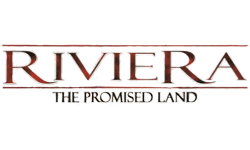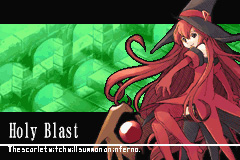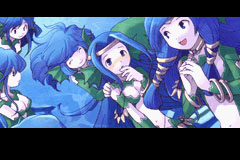|
|

|
BATTLE SYSTEM
|

|
INTERACTION
|

|
ORIGINALITY
|

|
STORY
|

|
MUSIC & SOUND
|

|
VISUALS
|

|
CHALLENGE
|
Moderate
|
COMPLETION TIME
|
15-20 Hours
|
|
OVERALL
5.0/5
|
Rating definitions
|
|
|
The Gameboy Advance, the tiny little handheld that could, has been something of a revelation for RPG fans alienated by the ever-increasing glitz and glamour of the high-powered Sony and Microsoft consoles. While portable console gaming long predated the GBA, preceding systems were never true RPG homes. But that all changed with the GBA, which in many respects sought to emulate older home consoles such as the SNES, reinvigorating an entire style of gameplay and storytelling that had largely been ignored in the intervening years with the advent of graphical advancements, streaming orchestrally-styled soundtracks, full motion video, and a greater and greater push towards 3D. The GBA, however, made a name for itself by returning to the -- some would say more simplistic -- styles of older RPGs, thus inviting a flood of developers eager to try their hand at the new Super Nintendo. And surprisingly, few games demonstrated the success of this better than Riviera.
I say surprisingly because little in Riviera's development background would lead one to expect great things. The game was developed by Sting, a company primarily remembered for the somewhat imaginative, but still flatly mediocre dungeon-crawling Evolution series on the Dreamcast (and later, Gamecube). Riviera's story, on paper, seemed similarly unoriginal with only hints of imaginative deviation from the norm. Meanwhile, the localization was being conducted by cult publisher Atlus. Atlus, while having brought America some truly outstanding hits such as the Ogre series, has also brought over some fairly execrable games such as Tail Concerto and Kartia. They're a hit-and-miss publisher since they specifically seek out the sort of games most publishing companies wouldn't touch. Given the rest of what was known about Riviera, it looked likely to be a miss.
 Sweet Scarlet Witchery
Sweet Scarlet Witchery
|
|
But, to my delight, I was wrong; Riviera, far from being a miss, turned out to be one of the best RPG offerings on a system swimming in exceptional content. It offers entirely innovative and fresh gameplay combined with beautiful, luscious hand-drawn artwork and sprites, a classic high quality synth soundtrack, and a charming and compelling cast of characters that force the player to care about the movingly deep story, which overcame any weaknesses it had on paper.
The game starts unassumingly enough with Ein, a Grim Angel, and his black cat familiar, Rose, as they march eagerly towards their gods-appointed duty of activating the powerful force known as the Retribution, destroying the cursed land of the demons that would seek to destroy the gods and their anointed Seven Magi. Ein is led by Ledah, a more experienced Grim Angel who chides the enthusiastic youth to be more careful and focused on their duty. Ein attempts to oblige, ready to prove himself to Ledah and Hector, one of the Magi, as a worthy warrior and valued servant of the gods.
Ein and Ledah soon meet with a beautiful but quiet woman who identifies herself as Ursula. Their master, Hector, reappears and orders the two Grim Angels to fight her, proclaiming Ursula to be amongst the demons seeking the overthrow of the gods. Ein is reluctant, but he trusts in his upbringing, his companions, and his skills as a Grim Angel. But the battle goes poorly, and he finds himself cut off from the guidance of Ledah and Hector, and with an entire world full of gentle people to protect, Ein must question what he knows and come to his own conclusions about the destiny he'll take.
Stop me if you've heard all of this before. As mentioned, the story doesn't seem to be ground breaking on paper. As it progresses, the experienced player will find little in it to be unpredictable or new. But in the tradition of games like Lunar, Riviera manages to bring its story to life in ways that transcend the plot itself. The world is a beautiful one, with a charming innocence and heartfelt warmth exemplified by the only true town in the game, Elendia. Here, Ein (and the player) meet the sort of people that really do make saving the world a worthwhile endeavor: his caretakers, and new companions, sisters Fia and Lina; the silent mermaid and the adorably curmudgeonly fairy; the young couple with their playful children; the dedicated witch and the storytelling bard. Ein will later meet two additional companions, the earnest Serene and the entirely confused Scarlet Witch, Cierra. These two prove equally adept at winning over the most cynical player with their kindness and charm. But don't think that everything is sunshine and roses -- the game manages to achieve moments of real emotional depth and sadness.
Where Riviera truly shines is in the interactions between the five main characters. As they explore the lush dungeons of Riviera, they engage in frequent conversation, all of which is brilliantly written dialog serving to make these characters feel more real and personable. Their personalities, likes and dislikes, the reasons for their fighting -- all of these are exposed through their interactions with one another, with none of the five being neglected. Adding to the depth of this stunning dialog is the player control over these numerous conversational scenes. The player is presented with choices in almost every conversation, and Ein's responses can bring about subtle (or not so subtle, often to incredibly humorous effect) changes in the way the rest of the conversation plays out.
 Riviera's Anime Influences are Many
Riviera's Anime Influences are Many
|
|
Beyond just giving the player greater control over the character interaction in the game, this feature also serves as the primary basis for the game's replayability. The remarks, comments, and jokes that Ein makes will shift the affections of the four girls. Choosing to compliment Fia on her knowledge of plant-life and similarly arcane subjects will cause her affections towards Ein to rise. Taking one side in a disagreement between Lina and Serene can cause one girl to like Ein more, but the other to get annoyed. And cracking a joke at one of the girls' expense will usually lead to funny results, but a decrease in her affections towards Ein. At the end of the game, Ein will wind up with one of the girls, whichever one he won over the most, thus inviting replays to try and get the other endings.
This control over the character interaction serves to dilute what might otherwise present a problem in the game: the story's linearity. But it's clear that the makers of Riviera chose to focus on character over plot, and because of the simple and charming nature of the plot, it's hard to get bogged down in what it may fail to do. And as to the conversational control: despite the fact that almost every conversational cut-scene presents around four or five choices, the player never feels overwhelmed by the choices present, feeling as though he's missing out by picking one option over another. The dialog is well-written regardless of the choice, and the conversations flow so well that it never feels like a bad thing to go with whatever answer seems like the most fun.
The gameplay is another area where Riviera, thankfully, exceeds. While the story and character development may hearken back to the days of the classics, Riviera instead tries a more innovative approach with its gameplay. Gone are character levels, and gone also are the traditional hallmarks of the menu-driven RPG combat system -- there's no Fight command, no Skill or Magic commands. Instead, everything in Riviera is driven by item-usage. Every item in the game has a fixed use for a given character; some characters will use particular items well (such as Ein with all variety of swords), while others will fail to use them properly at all. What might traditionally be done as a Fight command is in Riviera simply using an item that will result in a combat effect. To perform a magical effect, a character must use an item which will give them a magical effect -- but the effects are different for each character. For instance, Fia using a staff will result in a healing spell being cast, while Cierra using that same staff will instead cast a fireball, and if Ein uses the staff, he'll strike an enemy with it.
As characters use items with which they have some potential, they can learn special skills called Overbreaks. As the heroes damage the enemies (and vice versa) an Overbreak gauge will build up. When it's full, characters can use an item's special Overbreak skill, which will normally unleash a much more powerful effect. These Overbreaks, however, also serve as the game's replacement for character levels: whenever a character learns a new skill, he'll get a commensurate increase in his stats such as strength, magic, and HP. Acquiring a variety of weapons, then, becomes a necessity, introducing some strategic elements to the gameplay since all weapons have limited uses, only four items can be taken into any battle, and there's a limited inventory space which may occasionally lead to item juggling.
If all of this sounds complex, it's not: while markedly different from what's done in nearly every other RPG, the learning curve is minimal and the different functions and possibilities of the systems are explained, in more well written dialog, in the early stages of the game. It's easy-to-grasp gameplay that still results in true freshness and innovation -- a rare combination, adding to Riviera's successes.
The game comes out at the twilight of the Gameboy Advance, and it accordingly squeezes every ounce of power out of the system where graphics and sound are concerned. The music is fun and well composed, a high quality synthesized with some truly rocking battle tracks. Riviera also offers limited voice acting in the game's battles, and it's the best yet heard on the GBA, used mainly for the distinctly old school style of announcing special attacks before performing them.
The game's graphics are outstanding, a homage to what 2D is really capable of achieving. Sprites are distinctive, well animated, and vividly colorful. The hand-drawn backgrounds are similarly vibrant, helping to bring Elendia and Riviera to life, and making the main locations (the dungeons) a picturesque joy through which to travel. Enemies are well designed, and battle effects are great to look at -- particularly the multitude of unique Overbreak skills.
But the focus is never so much on sheer graphical prowess as it is on old style artistry, and even that pales in comparison to the strides Riviera makes in gameplay innovation and character interaction. It's a fun, engrossing game, and it'd be well worth your while to grab this little gem and experience its magic.
Review Archives
|









